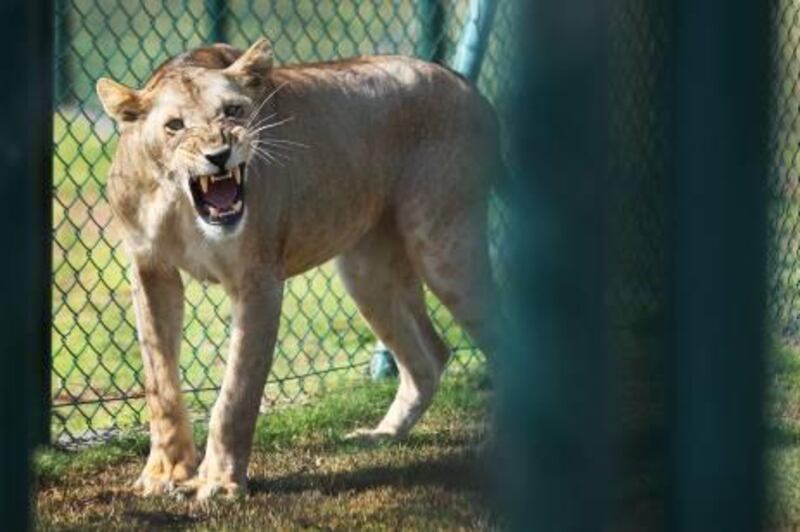DUBAI //Collectors are bypassing regulations designed to protect wild animals such as lions and tigers, says a veterinarian who specialises in treating exotic pets.
An import permit should be obtained for every animal listed as "requiring protection" under the Convention on International Trade in Endangered Species (Cites).
But a Dubai vet says that does not happen.
"I see about 10 new lions a year and none of them has papers," said Dr Peter Jaworski. "I haven't seen a single Cites certificate saying that a big cat was bred in captivity; none. The owners always say they have them but I haven't seen any."
Legally imported big cats are bred in captivity so the trade does not affect wild populations.
Dr Jaworski was speaking after official figures revealed a rise in the number of lions and tigers brought legally into the country, although a Cites official said permits were never issued to private owners.
This month, Ajman became the first emirate to ban the keeping of dangerous animals in private homes. Last July, a two-year-old girl was attacked by a lion cub in Ajman and had to be rescued by a maid.
"Keeping these animals is becoming more and more popular but I don't know why," said Dr Jaworski. "Everyone wants to possess them."
He said many lions bought as cubs were put down when they grew up because they became dangerous and difficult to handle.
"When you get a lion, legally or illegally, the poor animal is condemned to death," Dr Jaworski said.
The number of import permits granted in the UAE for lions has risen greatly, the latest figures show.
A total of 113 were issued over the 10 years to the end of 2009, but 37 permits were granted in 2010. This compares with 13 the previous year and just six in 2008.
There has been a similar increase with tigers. No permits were issued in 2001 and 2002, and over the next few years the number fluctuated between four and 10. But in 2009, the number rose to 13 and in 2010 it increased to 22.
The figures are contained in the Cites database. The convention was drawn up in 1973 to ensure the trade in wild animals and plants did not threaten the survival of endangered species.
All Cites member countries are required to submit annual reports detailing imports and exports of all listed species. The UAE signed up in 1990, with the convention overseen by the Ministry of Environment and Water and the Environment Agency-Abu Dhabi (Ead).
Abdul Rab Al Hamiri, the assistant director of Cites and deputy director of inspection and environmental compliance at Ead, said permits were issued only for scientific research.
"There is greater demand for them," Mr Al Hamiri said. "Al Ain Zoo is getting bigger, the Abu Dhabi Wildlife Centre is getting bigger, and also some of the wildlife management offices for the sheikhs are giving more attention to big cats.
"We never issue a personal import permit for big cats, never since day one of Cites. Keeping animals as pets is very bad. Wildlife is for the wild and it doesn't belong in houses. Animals that can be cute when they're young, four or five months later become a problem."
Dr Reza Khan, the wildlife and zoo specialist at Dubai Municipality, said: "Nobody should keep any dangerous wild animal as a pet unless they have sufficient space, proper housing and trained manpower, as well as animal healthcare facilities to take care of such animals.
"Wild animals can never be fully controlled by people and sooner or later these will pose danger to handlers of such animals or their owners. So why should you take the risk by keeping wild animals at home?"






